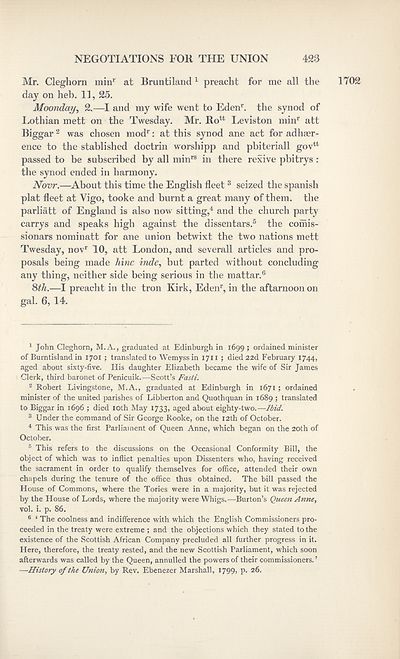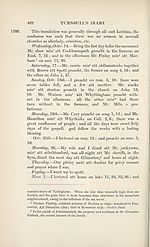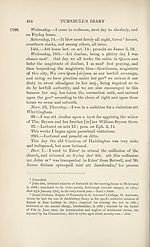Series 1 > Miscellany of the Scottish History Society (First volume)
(520) Page 423
Download files
Complete book:
Individual page:
Thumbnail gallery: Grid view | List view

NEGOTIATIONS FOR THE UNION
423
Mr. Cleghorn minr at Bruntiland1 preacht for me all the
day on heb. II, 25.
Moonday, 2.—I and my wife went to Edenr. the synod of
Lothian mett on the Twesday. Mr. Rott Leviston minr att
Biggar 2 was chosen modr: at this synod ane act for adhaer-
ence to the stablished doctrin worshipp and pbiteriall gov*4
passed to be subscribed by all minrs in there rexive pbitrys :
the synod ended in harmony.
Novr.—About this time the English fleet 3 seized the Spanish
plat fleet at Vigo, tooke and burnt a great many of them, the
parliatt of England is also now sitting,4 and the church party
carrys and speaks high against the dissentars.5 the comis-
sionars nominatt for ane union betwixt the two nations mett
Twesday, novr 10, att London, and severall articles and pro¬
posals being made him inde, but parted without concluding
any thing, neither side being serious in the mattar.6
Sth.—I preacht in the tron Kirk, Edenr, in the aftamoon on
gal. 6, 14.
1 John Cleghorn, M. A., graduated at Edinburgh in 1699 ; ordained minister
of Burntisland in 1701 ; translated to Wemyssin 1711 ; died 22d February 1744,
aged about sixty-five. His daughter Elizabeth became the wife of Sir James
Clerk, third baronet of Penicuik.—Scott’s Fasti.
2 Robert Livingstone, M.A., graduated at Edinburgh in 1671; ordained
minister of the united parishes of Libberton and Quothquan in 1689 ; translated
to Biggar in 1696 ; died 10th May 1733, aged about eighty-two.—Ibid.
3 Under the command of Sir George Rooke, on the 12th of October.
4 This was the first Parliament of Queen Anne, which began on the 20th of
October.
5 This refers to the discussions on the Occasional Conformity Bill, the
object of which was to inflict penalties upon Dissenters who, having received
the sacrament in order to qualify themselves for office, attended their own
chapels during the tenure of the office thus obtained. The bill passed the
House of Commons, where the Tories were in a majority, but it was rejected
by the House of Lords, where the majority were Whigs.—Burton’s Queen Anne,
vol. i. p. 86.
6 ‘ The coolness and indifference with which the English Commissioners pro¬
ceeded in the treaty were extreme ; and the objections which they stated to the
existence of the Scottish African Company precluded all further progress in it.
Here, therefore, the treaty rested, and the new Scottish Parliament, which soon
afterwards was called by the Queen, annulled the powers of their commissioners. ’
—History of the Union, by Rev. Ebenezer Marshall, 1799, p. 26.
1702
423
Mr. Cleghorn minr at Bruntiland1 preacht for me all the
day on heb. II, 25.
Moonday, 2.—I and my wife went to Edenr. the synod of
Lothian mett on the Twesday. Mr. Rott Leviston minr att
Biggar 2 was chosen modr: at this synod ane act for adhaer-
ence to the stablished doctrin worshipp and pbiteriall gov*4
passed to be subscribed by all minrs in there rexive pbitrys :
the synod ended in harmony.
Novr.—About this time the English fleet 3 seized the Spanish
plat fleet at Vigo, tooke and burnt a great many of them, the
parliatt of England is also now sitting,4 and the church party
carrys and speaks high against the dissentars.5 the comis-
sionars nominatt for ane union betwixt the two nations mett
Twesday, novr 10, att London, and severall articles and pro¬
posals being made him inde, but parted without concluding
any thing, neither side being serious in the mattar.6
Sth.—I preacht in the tron Kirk, Edenr, in the aftamoon on
gal. 6, 14.
1 John Cleghorn, M. A., graduated at Edinburgh in 1699 ; ordained minister
of Burntisland in 1701 ; translated to Wemyssin 1711 ; died 22d February 1744,
aged about sixty-five. His daughter Elizabeth became the wife of Sir James
Clerk, third baronet of Penicuik.—Scott’s Fasti.
2 Robert Livingstone, M.A., graduated at Edinburgh in 1671; ordained
minister of the united parishes of Libberton and Quothquan in 1689 ; translated
to Biggar in 1696 ; died 10th May 1733, aged about eighty-two.—Ibid.
3 Under the command of Sir George Rooke, on the 12th of October.
4 This was the first Parliament of Queen Anne, which began on the 20th of
October.
5 This refers to the discussions on the Occasional Conformity Bill, the
object of which was to inflict penalties upon Dissenters who, having received
the sacrament in order to qualify themselves for office, attended their own
chapels during the tenure of the office thus obtained. The bill passed the
House of Commons, where the Tories were in a majority, but it was rejected
by the House of Lords, where the majority were Whigs.—Burton’s Queen Anne,
vol. i. p. 86.
6 ‘ The coolness and indifference with which the English Commissioners pro¬
ceeded in the treaty were extreme ; and the objections which they stated to the
existence of the Scottish African Company precluded all further progress in it.
Here, therefore, the treaty rested, and the new Scottish Parliament, which soon
afterwards was called by the Queen, annulled the powers of their commissioners. ’
—History of the Union, by Rev. Ebenezer Marshall, 1799, p. 26.
1702
Set display mode to:
![]() Universal Viewer |
Universal Viewer | ![]() Mirador |
Large image | Transcription
Mirador |
Large image | Transcription
Images and transcriptions on this page, including medium image downloads, may be used under the Creative Commons Attribution 4.0 International Licence unless otherwise stated. ![]()
| Scottish History Society volumes > Series 1 > Miscellany of the Scottish History Society (First volume) > (520) Page 423 |
|---|
| Permanent URL | https://digital.nls.uk/127087101 |
|---|
| Attribution and copyright: |
|
|---|
| Description | Over 180 volumes, published by the Scottish History Society, containing original sources on Scotland's history and people. With a wide range of subjects, the books collectively cover all periods from the 12th to 20th centuries, and reflect changing trends in Scottish history. Sources are accompanied by scholarly interpretation, references and bibliographies. Volumes are usually published annually, and more digitised volumes will be added as they become available. |
|---|


